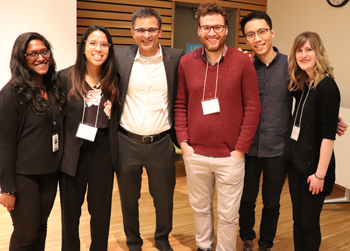Using data analytics to help improve patient care

By Mary Dickie

(left to right) Kasthuri Karunanithi, Chloe Pou-Prom, Dr. Muhammad Mamdani, Joshua Murray, David Dai and Michaelia Young.
Building a community of data experts to share best practices and ultimately improve patient care was the aim of the inaugural Data Analytics for Sustaining Hospitals (DASH) Summit, held at St. Michael’s Li Ka Shing Knowledge Institute on Dec. 3.
More than 60 information technology leaders, decision support leaders and scientists from 14 GTA hospitals gathered to share their approaches to data acquisition, management, storage and analytics and discuss ways to make them more efficient and effective.
Health care is lagging behind industries like transportation, banking and auto manufacturing when it comes to using data effectively, says Dr. Muhammad Mamdani, director of the Li Ka Shing Centre for Healthcare Analytics Research and Training (CHART) and leader of the first-ever summit. He thinks that sharing knowledge between hospitals in forums like the DASH Summit could help to remedy that, leading to improvements not only in efficiency but in patient care.
“I don’t think there are many cities in the world that can compete with the talent that Toronto has, especially in the analytic space,” Dr. Mamdani says. “Our data stores and data scientists are exceptional. But do we have a concerted, thoughtful way of leveraging these assets? I don’t think we do.
“Data analytics is our new norm, our new environment, whether we like it or not. It’s in our best interests to stick together and collectively become not only local leaders but international leaders, because we have the talent here.”
Dr. Mamdani says that virtually every facet of patient care could benefit from improved data analytics, from managing admissions to cardiology services and surgical procedures.
“A team of cardiologists conducted a chart review and found that only half of the patients eligible to take blood-thinning drugs, which reduce the risk of a stroke by about 60 to 70 per cent, actually received them, because it takes a while to figure out their eligibility and make sure they’re stable,” he explains.
“We want to know if we can use an algorithm that is able to whip through hundreds of patient records within a minute and say: here are the seven patients that are eligible. We’re doing that now as a pilot. And there are many projects like this, in many areas.”
The summit featured four panels in which representatives of different hospitals discussed their institution’s approach to data infrastructure and organization, the tools they use for data visualization, their data governance and culture, and advanced analytics, followed by breakout sessions on subjects including privacy and security, unstructured text data, data access, analytics such as machine learning and research ethics. The panelists often found that they were dealing with similar issues in different ways: for instance, all four hospitals on one panel reported using different data visualization programs for essentially the same purpose.
“There are some problems that a lot of hospitals are struggling with, and it seemed like different people had different parts of the solution,” says Dr. Mamdani. “Some phenomenal ideas were presented and discussed. Wouldn’t it be great if this evolved into a bigger community, including clinicians and management, where we all work together around this whole data issue and how we can leverage it to benefit our patients? We’d like to see DASH as the start of a community that comes together regularly and continues to learn from one another.
“At the end of the day it’s the patient that’s going to benefit from us better understanding what’s happening to them,” he adds. “It’s about us being able to collectively pull that information and see from that data what we can do for patients to make them better. That is really who’s going to win, and that’s hopefully what’s driving us to come together.”
About St. Michael’s Hospital
St. Michael’s Hospital provides compassionate care to all who enter its doors. The hospital also provides outstanding medical education to future health care professionals in more than 29 academic disciplines. Critical care and trauma, heart disease, neurosurgery, diabetes, cancer care, care of the homeless and global health are among the Hospital’s recognized areas of expertise. Through the Keenan Research Centre and the Li Ka Shing International Healthcare Education Centre, which make up the Li Ka Shing Knowledge Institute, research and education at St. Michael’s Hospital are recognized and make an impact around the world. Founded in 1892, the hospital is fully affiliated with the University of Toronto.
St. Michael’s Hospital with Providence Healthcare and St. Joseph’s Health Centre now operate under one corporate entity as of August 1, 2017. United, the three organizations serve patients, residents and clients across the full spectrum of care, spanning primary care, secondary community care, tertiary and quaternary care services to post-acute through rehabilitation, palliative care and long-term care, while investing in world-class research and education.
